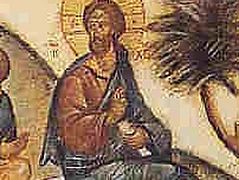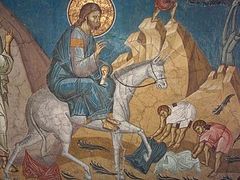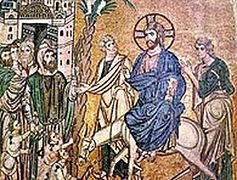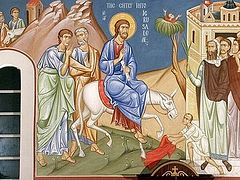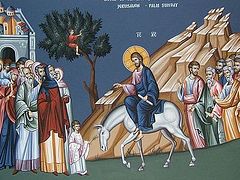Philippians 4:4-9
John 12:1-18
Human beings are blessed with the ability to focus on what is most important. So much of what we do at work or school, for example, requires that we tune out distractions and give our minds to the task before us.
St. Paul reminds us that we especially need to do so in the Christian life by giving our minds to what is true, noble, just, pure, lovely, virtuous, and praise worthy. Palm Sunday is a time that we all need this reminder as we enter into the mystery of our salvation as Jesus Christ journeys to His cross, descent into Hades, and glorious resurrection.
Nothing about this week comes naturally or easily to us. We understand wanting our enemies to suffer, but not freely suffering for their sake. We understand religious people judging others with self-righteousness, but not loving sinners to the point of dying on their behalf. We understanding wanting our side to win, but not that true victory comes by laying aside all that looks like power in this world. We think that we understand a remote God in the heavens who does not understand how hard life is down here, not One who hangs on a cross, occupies a tomb, and descends to Hades.
There are times when what has been cloudy and confused becomes bright and clear, when what has been hidden is made manifest for all to see. Today is one of those times. For Jesus Christ, who revealed that He is the resurrection and the life by raising His friend Lazarus from the dead, now enters Jerusalem as the long-awaited Messiah to the welcoming cheers of the crowd.
But even before He gets to Jerusalem, the forces of darkness had decided to kill Christ because they could tell that someone who could raise the dead was a threat to their power; for He was neither a conquering general nor a Pharisee-like interpreter of the Law; and those nationalistic religious leaders had no use for a Messiah who did not serve their schemes of domination.
On Palm Sunday, it becomes clear that the Savior Who enters Jerusalem today is the Lamb of God who takes away the sins of the world. He is the Passover Lamb whose death and resurrection will conquer death itself. Mary, Lazarus’ sister, performed a prophetic act when she anointed Christ with the same kind of costly ointment that was used to anoint the bodies of the dead. This Messiah, this One who is truly anointed to save His people and the whole world, will be rejected by the leaders of the Jews and crucified under the authority of the Romans. And when He is lifted up upon the Cross, He will draw all who believe in Him-- Jew, Gentile, male, female, rich, poor, all nations, classes, and races—to the life of a Kingdom that transcends this world and our petty divisions.
Jesus Christ will not reign as a soldier, a politician, or a rich man, but as a Suffering Servant, a slaughtered lamb, a despised victim of torture and capital punishment. The crowds are right on Palm Sunday to welcome Him as a conquering King in Whom God’s promises will be fulfilled. But they misunderstand what kind of King He is and how He will conquer. For He rules from a cross and an empty tomb; instead of killing Roman soldiers, He kills death by allowing Himself to be killed; in the place of a magnificent stallion fit for a king, He rides a humble donkey that would impress no one.
The crowd is right, “Blessed is He Who comes in the name of the Lord, the King of Israel.” They shout “Hosanna,” which is a plea for God’s salvation to come upon the earth. And it does through the Lord’s death and glorious resurrection. But that’s not what the crowds expected; it’s apparently not what the disciples or anyone else anticipated. For it goes against all our preconceived notions of what it means to be successful, to be powerful, to rule upon the earth, and to be respectable and religious.
And it’s still a very hard lesson for us to accept, for there is too much of the world in all of us and the demons never work harder than when we are trying to grow closer to Christ. That’s why we need to follow St. Paul’s advice to focus on what is truly holy this week, to rejoice always, and to “let your gentleness be known to all men.” As St. Paul wrote, “The Lord is at hand” which is never more true than on this feast as He enters Jerusalem to the cheers of the crowds.
In Holy Week, what had been cloudy becomes clear; the truth is out in the open and we cannot ignore it any longer. Jesus Christ is the Passover Lamb, the Lamb of God Who takes away the sins of the world. He is our Champion, our Savior, our King, yet in His humility and love, the incarnate Son of God suffers on the cross as the lowest of the low in order to bring us to the heights of heaven and the joy of life eternal through His empty tomb.
And this week we journey with Him to that cross, becoming participants in His passion. Like Lazarus, we sit at table with Him. Like Mary, we anoint Him for burial. Like those gathered in Jerusalem, we welcome Him with palms and praises. Like the disciples, we eat the Passover with Him; like His mother Mary the Theotokos, the other faithful women, and the Apostle John, we kneel before His cross. Like Joseph of Arimathea and Nicodemus, we bury Him. And like the stunned myrrh-bearers and the doubting apostles, we will marvel at the unspeakable joy of His resurrection. For what looks like complete failure is actually total triumph, as we will see in the early hours of next Sunday.
Holy Week is the climax of Jesus Christ’s life and of ours, too. For He goes to the cross for us; He dies and rises for our salvation, to bring us into the unending joy of eternal life, to defeat our ancient foe. So it’s time to lay aside our usual distractions, excuses, and obsessions, and enter into the passion of our Lord by worshiping Him in the services of the church, as well as in every thought, word, and deed this week. If we can’t attend literally every service, can all pray at home, read the Bible passages for Holy Week, and give less attention to the world and more to God.
It’s time to embrace the great mystery of our salvation, of our Savior’s infinite love and mercy, and thus share already in the blessedness of the Kingdom of Heaven. Holy Week is the time to enter into the Light that shines brightly even from the terror of the cross and the darkness of the tomb. Yes, our Savior has endured all these evils for us purely out of love; and He will soon rise over them triumphantly.
On Palm Sunday, it is clear who Jesus Christ is: The Lamb of God Who takes away the sins of the world. How will we respond to Him as He goes to the cross for us? Hopefully, with the fear of God and faith and love, we will draw near and not abandon or disregard Him.
Yes, that will take intentional focus and the discipline to turn away from temptations, distractions, and unholy thoughts that become obstacles along our path. Nonetheless, we must follow St. Paul’s guidance to “Be anxious for nothing” and allow “the peace of God, which surpasses all understanding…[to] guard your hearts and minds through Christ Jesus.”
“Blessed is He who comes in the name of the Lord, the king of Israel. Hosanna in the highest!”


